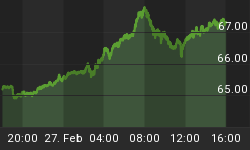Stocks continue to climb inexorably: 21 of the 33 trading days this year have seen stocks end the day higher. About the only market that is doing appreciably better is gasoline. Retail gasoline prices have risen 33 of the past 33 calendar days, and front Unleaded has risen 22 of the 33 trading days in 2013.
This brings us, of course, to the question: if gasoline rises every day, then how long will it be until higher gasoline prices start to affect equity prices?
The question is not quite as straightforward as it appears. On the surface, we have two competing effects: first, stronger economic activity will tend to support both gasoline prices and corporate earnings, giving a lift to equities. And some recent data, such as last Friday's hefty upside surprise in the Empire Manufacturing figures for February (+10.04 when -2.00 was expected), suggests that growth in Q1 may not be slowing too much further although the European, Japanese, and US economies each contracted in Q4.
(By the way, did you realize that? Each of the three biggest First World economies contracted in Q4 and the US equity markets declined -1.0%).
Not that equities necessarily must pull back when growth lags (if they did, then all good economists would also be good traders), but when you're talking about markets that are pricing in a continuation of historically wide margins and historically high price-earnings multiples, it would seem that a pullback when there is weakness economically is as good a time as any. Stocks can't go up in a line forever, can they?
Actually, they can, but we'll get to that in a minute. I mentioned two competing effects that are apparent, with one of these being the stronger economic activity will tend to support both gasoline prices and earnings. The other is that higher gasoline prices have a depressing effect on discretionary expenditures. Along with the higher payroll taxes which manifested in January and the lower Q1 incomes as a result of dividends being pushed into Q4, the higher gasoline prices may have contributed to what a finance VP at Wal-Mart described as "a total disaster" start to February. This is an "automatic stabilizer" effect at work: higher growth tends to produce higher energy prices, which tend in turn to dampen economic growth - and vice-versa.
So which effect dominates? Can gasoline prices and stock prices keep going up together?
The answer is that their nominal prices can absolutely continue to rise together, but their real prices cannot. If I double the price level, then no matter what happens to growth or the marginal rate of substitution between gasoline and all other discretionary goods and services, both nominal gasoline prices and nominal corporate earnings (and therefore, quite likely equity prices) will both rise. However, higher real energy prices imply lower real equity prices eventually. But that's not a day-trade; in the fairly short run (say, several months) the price level is roughly constant so that one of these two markets is likely to decline in nominal terms.
Frankly, the odds in my mind are on stocks breaking first. But as the chart below (source: Bloomberg) shows, the ratio of gasoline to stocks is not really out-of-whack one way or the other. This is unleaded regular gasoline divided by the S&P level...and what's fascinating to me is how regular the relationship has been (especially in 2010!).

By the way, the distinction about nominal and real prices also is relevant for the observation some have made that gasoline inventories are reasonably adequate, but prices continue to rise. Gasoline prices are high in nominal terms, but not as high in real terms. In nominal terms, unleaded has risen 105% since the second Bush inauguration, but only 65% in real terms. That still sucks, mind you, and is one reason that growth hasn't been robust in a while. As of December 2004, gasoline was 3.934% of the average consumption basket; according to the BLS (new numbers are out today!) that became 5.274% as of December 2012.[1] Therefore, we spend about 1.34% less of our total consumption on other things than we did in 2004.
With gasoline, medical care, and college tuition all squeezing us (not to mention taxes, which is not a consumption item and therefore not in the CPI), it isn't surprising that we're spending a smaller proportion of our consumption basket on apparel and housing than we used to (for a longer-term view, see my comment from a couple of weeks ago "Fun With the CPI"). These are long-term, secular trends. What could hurt the market in the shorter-run is that when there is a significant move in energy prices, we can't change the amount of housing we consume to compensate. We stop buying the Wal-Mart things. And we save less.
And eventually, we stop buying stocks. Don't we?
[1] N.b.: that doesn't mean we spend 35% more on gasoline now; as noted, gasoline has doubled in price. But 35% more of our consumption is spent on gasoline, than we spent previously. It is interesting that with a 65% increase in the real price of gasoline, our gasoline consumption has only risen 35% (due to smaller cars, better gas mileage, more air travel, more mass transit, etc).















